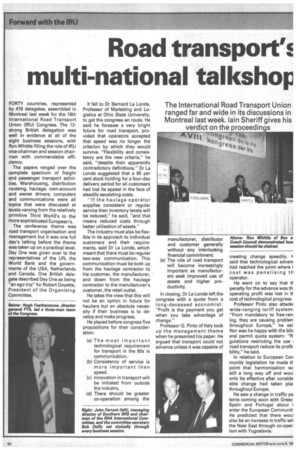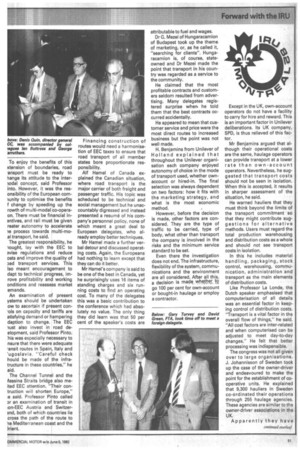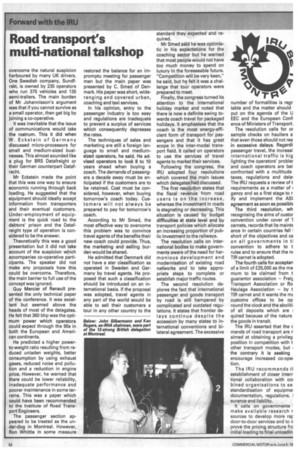Road transport't multi-national talkshop
Page 48

Page 49

Page 50

If you've noticed an error in this article please click here to report it so we can fix it.
The International Road Transport Union ranged far and wide in its discussions in Montreal last week. lain Sheriff gives his verdict on the proceedings
FORTY countries, represented by 476 delegates, assembled in Montreal last week for the 18th International Road Transport Union (1RU) Congress. The 12strong British delegation was well in evidence at all of the eight business sessions, with Ron Whittle filling the role of IRU vice-chairman and session chairman with commendable efficiency.
The papers ranged over the complete spectrum of freight and passenger transport activities. Warehousing, distribution routeing, haulage, own-account and owner drivers, computers and communications were all topics that were discussed at levels varying from the relatively primitive Third World's to the more sophisticated European's.
The conference theme was road transport organisation and management but it was one full day's talking before the theme was taken up on a practical level. Day One was given over to the representatives of the UN, the World Bank and the governments of the USA, Netherlands and Canada. One British delegate described Day One as being "an ego trip" for Robert Goyette, President of the Organising Committee. It fell to Dr Bernard La Londe, Professor of Marketing and Logistics at Ohio State University, to get the congress en route. He said he foresaw a very bright future for road transport, provided that operators accepted that speed was no longer the criterion by which they would survive. "Flexibility and consistency are the new criteria," he said, "despite their apparently contradictory definitions." Dr La Londe suggested that a 95 per cent stock holding for a four-day delivery period for all customers had lost its appeal in the face of steadily escalating costs.
"If the haulage operator supplies consistent or regular service then inventory levels will be reduced," he said, "and that means reduced costs through better utilisation of assets."
The industry must also be flexible in its approach to individual customers and their requirements, said Dr La Londe, which meant that there must be regular two-way communication. This communication must be both up from the haulage contractor to his customer, the manufacturer, and down from the haulage contractor to the manufacturer's customer, the retail outlet.
He takes the view that this will not be an option in future for hauliers but an absolute necessity if their business is to develop and make progress.
He placed before congress five propositions for their consideration: (a) The most important technological requirement for transport in the 80s is communication.
(b) Consistency of service is more important than speed.
(c) Innovation in transport will be initiated from outside the industry.
(d) There should be greater co-operation among the manufacturer, distributor and customer generally without any interlocking financial commitment.
(e) The role of road transport will become increasingly important as manufacturers seek improved use of assets and higher productivity.
In closing, Dr La Londe left the congress with a quote from a long-deceased economist: "Profit is the payment you get when you take advantage of change."
Professor C. Pinto of Italy took up the management theme when he presented his paper. He argued that transport could not advance unless it was capable of meeting change speedily. said that technological advarm had reached the point where i cost was penalising th Operator.
He went on to say that ti penalty for the advance was th operating profit was lost in th cost of technological progress.
Professor Pinto also attackE wide-ranging tariff system: "From mandatory to free-ran! ing, they are causing problerr throughout Europe," he sai Nor was he happy with the bila eral permit quota system: "R gulations restricting the use 1 road transport reduce its profit bility," he said.
In relation to European Con rnunity legislation he made point that harmonisation wi still a long way off and woul only be effective after conside able change had taken pia( throughout Europe.
He saw a change in traffic pa terns coming soon with Greec Spain and Portugal about enter the European Communit He predicted that there woul also be an increase in traffic wir the Near East through co-open tion with Yugoslavia.
To enjoy the benefits of this xtension of boundaries, road .ansport must be ready to hange its attitude to the inter.iodal concept, said Professor into. However, it was the resonsibility of the European cornlunity to optimise the benefits f change by speeding up the rowth of multi-modal co-operaon. There must be financial inentives, and rail must be given reater autonomy to accelerate le process towards multi-moal transport, he said.
The greatest responsibility, he iought, lay with the EEC to avise regulations and reduce oats and improve the quality of Dad transport services. This Iso meant encouragement to dapt to technical progress, imrove profitability and working onditions and reassess market emands.
An examination of present ystems should be undertaken ow to ascertain if present con.ols on capacity and tariffs are atisfying demand or hampering daption to change. The EEC lust also invest in road deelopment, said Professor Pinto. his was especially necessary to nsure that there were adequate ransit routes in Spain, Italy and 'ugoslavia. "Careful check hould be made of the infratructure in these countries," he aid.
The Channel Tunnel and the A essina Straits bridge also meited EEC attention. "Their contruction will shorten Europe," le said. Professor Pinto called ar an examination of transit in ion-EEC Austria and Switzerand, both of which countries lie cross the path of the route to he Mediterranean coast and the )rient.
Financing construction of routes would need a harmonisation of EEC taxes to ensure that road transport of all member states bore proportionate responsibility.
Alf Hamel of Canada explained the Canadian situation, where road transport is the major carrier of both freight and passenger traffic. His topic was scheduled to be technical and social management but he unaccountably digressed and instead presented a resume of his company's personnel policy, none of which meant a great deal to European delegates, who already employ better techniques.
Mr Hamel made a further verbal detour and discussed operating costs. Again, the Europeans had nothing to learn except that they can do it better.
Mr Hamel's company is said to be one of the best in Canada, yet he surprisingly uses 16 items of standing charges and six running costs to find an operating cost. To many of the delegates this was a basic contribution to the conference which had absolutely no value. The only thing they did learn was that 50 per cent of the speaker's costs are attributable to fuel and wages.
Dr G. Mezei of Hungaracamion of Budapest took up the theme of marketing, or, as he called it, "searching for clients". Hungaracamion is, of course, stateowned and Dr Mezei made the point that transport in his country was regarded as a service to the community.
He claimed that the most profitable contracts and customers seldom resulted from advertising. Many delegates registered surprise when he told them that the best contracts occurred accidentally.
He appeared to mean that customer service and price were the most direct routes to increased business but the point was not well made.
H. Benjamin& from Unilever of Holland explained that throughout the Unilever organisation each company enjoyed autonomy of choice in the mode of transport used, whether ownaccount or hired-in. The final selection was always dependent on two factors: how it fits with the marketing strategy, and what is the most economic method.
However, before the decision is made, other factors are considered. They are the type of traffic to be carried, type of body, what other than transport the company is involved in the risks and the minimum service standard to be set.
Even there the investigation does not end. The infrastructure, flexibility of the system, communications and the environment are all considered. After all this, a decision is made .whethes. to go 100 per cent for own-account or bought-in haulage or employ a contractor.
Except in the UK, own-account operators do not have a facility to carry for hire and reward. This is an important factor in Unilever deliberations. Its UK company, SPD, is thus relieved of this factor.
Mr Benjamins argued that although their operational costs are the same, haulage operators can provide transport at a lower rate than own-account operators. Nevertheless, he sug gested that transport costs should not be seen in isolation.
When this is accepted, it results in sharper assessment of the situation, he said.
He warned hauliers that they must think beyond the limits of the transport commitment so that they might contribute suggestions for alternative methods. Users must regard the total production warehousing and distribution costs as a whole and should not see transport costs in isolation.
In this he includes material handling, packaging,, stock control, warehousing, communication, administration and transport as the main elements of distribution costs.
Like Professor La Londe, the Dutch speaker emphasised that computerisation of all details was an essential factor in keeping control of distribution costs.
"Transport is a vital factor in the overall flow of things," he said. "All cost factors are inter-related and when computerised can be adjusted to meet day-to-day changes." He felt that better processing was indispensible.
The congress was not all given over to large organisations.
J. Johannisson of Sweden took up the case of the owner-driver and endeavoured to make the point for the establishment of co operative units. He explained that 9,300 hauliers in Sweden co-ordinated their operations through 255 haulage agencies. These agencies are similar to the owner-driver associations in the UK.
Apparently they have' overcome the natural suspicion harboured by many UK drivers. One Swedish company, Sundfrakt, is owned by 235 operators who run 375 vehicles and 135 semi-trailers. The main burden of Mr Johannisson's argument was that if you cannot survive as a small operator, then get big by joining a co-operative.
It was inevitable that the issue of communications would take the rostrum. This it did when W. Eckstein of Germany discussed micro-processors for small and medium-sized businesses. This almost sounded like a plug for BRS Datafreight or their German counterpart Datafracht.
Mr Eckstein made the point that this was one way to ensure economic running through back loading. He suggested that the equipment should ideally accept information from transporters and their eventual customers. Under-employment of equipment is the quick road to the debtors' prison and the Datafreight type of operation is considered to be the answer.
Theoretically this was a good presentation but it did not take account of the suspicion which accompanies co-operative participants. The speaker did not make any proposals how this could be overcome. Therefore, the main barrier to full use of the concept was ignored.
Guy Mercier of Renault presented the only technical paper of the conference. It was excellent but seemed above the heads of most of the delegates. He felt that 360 bhp was the optimum power which operators could expect through the 90s in both the European and American continents.
He predicted a higher powerto-weight ratio resulting from reduced unladen weights, better consumption by using exhaust gases, reduced noise and pollution and a reduction in engine price. However, he warned that there could be lower reliability, inadequate performance and poorer maintenance in some terrains. This was a paper which could have been recommended to the Institute of Road Transport Engineers.
The passenger section appeared to be treated as the under-dog in Montreal. However, Ron Whittle in some measure restored the balance for an impromptu meeting for passenger men but the main paper was presented by C. Smed of Denmark. His paper was short, wideranging and covered urban, coaching and taxi services.
In his opinion, entry to the passenger industry is too easy and regulations are inadequate to prevent a surplus of services which consequently depresses the rates.
The techniques of sales and marketing are still a foreign language to small and mediumsized operators, he said. He advised operators to look 8 to 10 years ahead when buying a coach. The demands of passengers a decade away must be anticipated if the customers are to be retained. Cost must be considered, however, when buying tomorrow's coach today. Custom e rs will not always be prepared to pay for tomorrow's coach.
According to Mr Smed, the most effective way to overcome this problem was to convince travel agents of the benefits their new coach could provide. Thus, the marketing and selling burden would be shared.
He admitted that Denmark did not have a star classification as operated in Sweden and Germany by travel agents. He proposed that such a classification should be introduced on an international basis. If the proposal was adopted, travel agents in any part of the world would be able to sell their customers a tour in any other country to the standard they expected and required.
Mr Smed said he was optimistic in his expectations for the coaching sector but he warned that most people would not have too much money to spend on luxury in the foreseeable future. "Competition will be very keen," he said, but he felt it was a challenge that tour operators were prepared to meet.
Finally, the congress turned its attention to the international holiday market and noted that there is now a definite swing towards coach travel for packaged holidays. It emphasises that the coach is the most energy-efficient form of transport for passengers and that it has great scope in the inter-modal transport field. It called on operators to use the services of travel agents to market their services.
Following the congress, the IRU adopted four resolutions which covered the main issues which delegates had discussed.
The first resolution states that the fiscal revenue from road users is on the increase, whereas the investment in roads is stagnating or decreasing. This situation is caused by budget difficulties at state level and by transport policies which allocate an increasing proportion of public investment to the railways.
The resolution calls on international bodies to make governments aware of the need for harmonious development and modernisation of existing road netirvorks and to take appropriate steps to complete or establish major traffic routes.
The second resolution deplores the fact that international passenger and goods transport by road is still hampered by complicated and outdated regulations. It states that frontier delays continue despite the accession by many states to international conventions and bilateral agreement. The excessive number of formalities is regr table and the matter should put on the agenda of the U EEC and the European Cont ence of Ministers of Transport.
The resolution calls for or sample checks on hauliers a that even those should not res in excessive delays. Regardi passenger travel, the increasi international traffic is hig lighting the operators' probler and coach operators are bei confronted with a multitude taxes, regulations and delal The IRU requests a review of t requirements as a matter of gency and as a first stage to r ify and implement the AS( agreement as soon as possiblE The third resolution, wh recognising the aims of custor convention under cover of 1 carnets, records that its maintc ance in certain countries fell short of the objectives and ca on all governments in tl convention to adhere to t rules and to ensure that the no TIR carnet is adopted.
The fourth calls for accepter of a limit of E25,000 as the ma mum to be claimed from t guarantor association — Freip, Transport Association or Flo Haulage Association — by t TIR carnet and it wants the nvi customs offices to be op round the clock and the abolitil of all deposits which are quired because of the nature the goods in transit.
The IRU asserted that the c mends of road transport are r aimed at obtaining a privileg position in competition with t other transport modes, but the contrary it is seeking encourage increased co-opei tion.
The IRU recommends tl establishment of closer interr tional collaboration with col bined organisations to se standardisation of equipmel documentation, regulations, surance and liability.
It calls on governments make available research r sources to develop more rap door-to-door services and to ii prove the pricing structure frc initial loading to final unloadin


























































